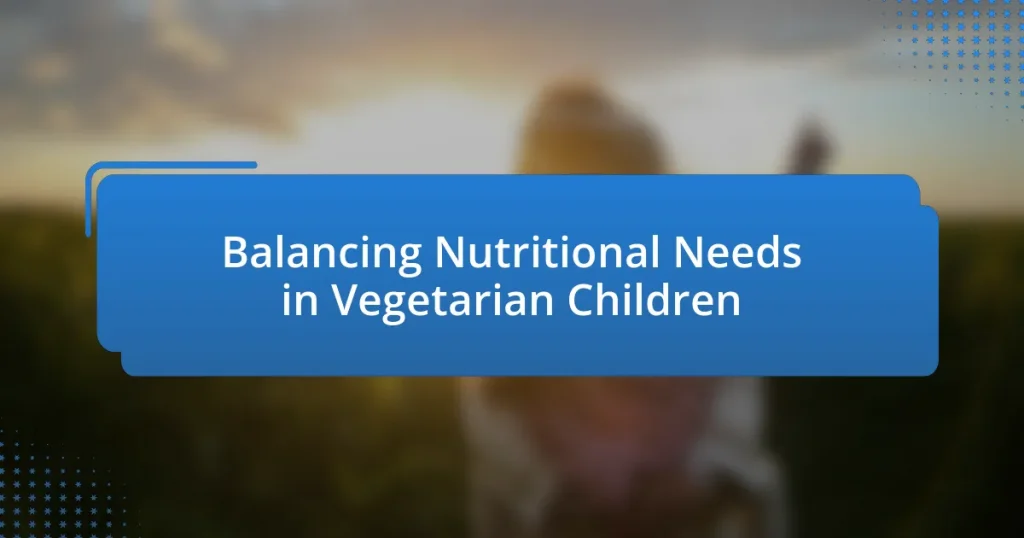The article focuses on balancing nutritional needs in vegetarian children, emphasizing the importance of a well-planned diet to support their growth and development. It outlines essential nutrients such as protein, iron, calcium, vitamin B12, vitamin D, omega-3 fatty acids, and zinc, highlighting their sources and the potential deficiencies that may arise in vegetarian diets. The article also discusses strategies for ensuring adequate nutrient intake, including meal planning, incorporating variety, and addressing common misconceptions about vegetarian nutrition. Additionally, it provides practical tips for parents to educate their children about nutrition and offers resources for vegetarian meal planning and recipes.

What are the nutritional needs of vegetarian children?
Vegetarian children require a balanced intake of essential nutrients to support their growth and development. Key nutritional needs include adequate protein, iron, calcium, vitamin B12, vitamin D, omega-3 fatty acids, and zinc.
Protein can be sourced from legumes, nuts, seeds, and dairy products. Iron, which is crucial for cognitive development, is best absorbed from plant sources like lentils and fortified cereals when paired with vitamin C-rich foods. Calcium is vital for bone health and can be obtained from dairy products or fortified plant-based alternatives. Vitamin B12, primarily found in animal products, necessitates supplementation or consumption of fortified foods for vegetarian children. Vitamin D, essential for calcium absorption, can be synthesized through sunlight exposure or obtained from fortified foods. Omega-3 fatty acids, important for brain health, can be sourced from flaxseeds and walnuts. Lastly, zinc, which supports immune function, can be found in beans, nuts, and whole grains.
These nutritional components are critical for the overall health and development of vegetarian children, ensuring they meet their dietary requirements effectively.
How do vegetarian diets differ from omnivorous diets?
Vegetarian diets differ from omnivorous diets primarily in their exclusion of meat and fish. While omnivorous diets include a variety of animal products, vegetarian diets focus on plant-based foods such as fruits, vegetables, grains, legumes, nuts, and seeds. This distinction leads to differences in nutrient intake; for example, vegetarians may have lower levels of saturated fat and cholesterol but may require careful planning to ensure adequate intake of nutrients typically found in animal products, such as vitamin B12, iron, and omega-3 fatty acids. Research indicates that vegetarian diets can provide sufficient nutrition when well-planned, but they may necessitate supplementation or alternative sources for certain nutrients that are more readily available in omnivorous diets.
What essential nutrients are commonly lacking in vegetarian diets?
Essential nutrients commonly lacking in vegetarian diets include vitamin B12, iron, calcium, omega-3 fatty acids, and zinc. Vitamin B12 is primarily found in animal products, and its deficiency can lead to anemia and neurological issues. Iron, while present in plant foods, is less bioavailable than the iron from meat, making it harder for vegetarians to meet their needs. Calcium is crucial for bone health, and vegetarians may not consume enough dairy or fortified alternatives. Omega-3 fatty acids, important for brain health, are predominantly found in fish, leading to potential deficiencies in vegetarian diets. Lastly, zinc, which supports immune function, is less readily absorbed from plant sources compared to animal sources.
How can vegetarian children meet their protein requirements?
Vegetarian children can meet their protein requirements by consuming a variety of plant-based protein sources such as legumes, nuts, seeds, whole grains, and dairy products if they are lacto-vegetarian. Legumes like lentils and chickpeas provide essential amino acids, while nuts and seeds offer healthy fats and additional protein. Whole grains such as quinoa and brown rice also contribute to protein intake. According to the USDA, a well-planned vegetarian diet can provide adequate protein, as plant proteins can be combined to form complete proteins, ensuring all essential amino acids are consumed.
Why is it important to balance nutrition in vegetarian children?
Balancing nutrition in vegetarian children is crucial to ensure they receive all essential nutrients for healthy growth and development. Vegetarian diets can lack certain nutrients, such as protein, iron, calcium, vitamin B12, and omega-3 fatty acids, which are vital for physical and cognitive development. For instance, a study published in the Journal of the American Dietetic Association found that vegetarian children are at risk of deficiencies in these nutrients if their diets are not carefully planned. Therefore, a balanced vegetarian diet must include a variety of foods to meet these nutritional needs and support overall health.
What are the potential health risks of unbalanced vegetarian diets?
Unbalanced vegetarian diets can lead to several health risks, including nutrient deficiencies, particularly in protein, iron, vitamin B12, calcium, and omega-3 fatty acids. These deficiencies can result in anemia, weakened immune function, impaired cognitive development, and bone health issues. For instance, a study published in the Journal of the American Dietetic Association found that vegetarian children often have lower levels of iron and vitamin B12 compared to their omnivorous peers, which can adversely affect their growth and development. Additionally, inadequate protein intake can hinder muscle development and overall energy levels, further impacting children’s health and well-being.
How does balanced nutrition support growth and development in children?
Balanced nutrition is essential for supporting growth and development in children by providing the necessary nutrients for physical and cognitive advancement. Adequate intake of proteins, vitamins, and minerals facilitates the development of strong bones, muscles, and organs, while also enhancing brain function and immune response. For instance, a study published in the Journal of Nutrition highlights that children who receive balanced diets rich in essential nutrients experience improved growth rates and cognitive performance compared to those with inadequate nutrition. This underscores the critical role of balanced nutrition in ensuring that children reach their full developmental potential.

What are the key nutrients to focus on for vegetarian children?
The key nutrients to focus on for vegetarian children include protein, iron, calcium, vitamin B12, vitamin D, omega-3 fatty acids, and zinc. Protein is essential for growth and development, and vegetarian sources include legumes, nuts, and dairy products. Iron is crucial for preventing anemia, and vegetarian sources such as lentils and fortified cereals can help meet these needs. Calcium supports bone health, with dairy and fortified plant-based alternatives being important sources. Vitamin B12, primarily found in animal products, is vital for nerve function and can be obtained through fortified foods or supplements. Vitamin D aids in calcium absorption and can be sourced from fortified foods or sunlight exposure. Omega-3 fatty acids, important for brain health, can be found in flaxseeds and walnuts. Lastly, zinc supports immune function and can be sourced from beans, nuts, and whole grains. These nutrients are critical for ensuring the healthy growth and development of vegetarian children.
What role do vitamins and minerals play in a vegetarian child’s diet?
Vitamins and minerals are essential for a vegetarian child’s diet as they support growth, development, and overall health. Key vitamins such as B12, D, and minerals like iron and calcium are critical for energy production, bone health, and cognitive function. For instance, vitamin B12, primarily found in animal products, is crucial for nerve function and the formation of red blood cells; vegetarian children may require fortified foods or supplements to meet their needs. Similarly, iron from plant sources is less bioavailable, making it important for vegetarian children to consume vitamin C-rich foods alongside iron-rich foods to enhance absorption. Calcium is vital for bone development, and vegetarian sources include fortified plant milks and leafy greens. These nutrients collectively ensure that vegetarian children receive adequate nutrition for their physical and mental development.
Which vitamins are crucial for vegetarian children and how can they be obtained?
Vegetarian children require several crucial vitamins, including Vitamin B12, Vitamin D, Iron, and Omega-3 fatty acids. Vitamin B12 can be obtained from fortified foods such as plant-based milks, breakfast cereals, and nutritional yeast, as it is primarily found in animal products. Vitamin D is essential for bone health and can be sourced from fortified foods and sunlight exposure. Iron, important for growth and development, can be found in legumes, tofu, and fortified cereals, but should be consumed with Vitamin C-rich foods to enhance absorption. Omega-3 fatty acids, vital for brain development, can be obtained from flaxseeds, chia seeds, and walnuts. These dietary sources ensure that vegetarian children meet their nutritional needs effectively.
What minerals should be monitored in vegetarian diets?
Vegetarian diets should monitor iron, calcium, zinc, and iodine. Iron is crucial for preventing anemia, as plant-based sources contain non-heme iron, which is less readily absorbed than heme iron from animal products. Calcium is essential for bone health, and vegetarians may not consume enough dairy or fortified alternatives. Zinc supports immune function and is found in lower amounts in plant foods compared to animal sources. Iodine is important for thyroid function, and vegetarian diets may lack sufficient iodine if not supplemented or if iodized salt is not used. These minerals are vital for the overall health and development of vegetarian children.
How can parents ensure adequate iron intake for vegetarian children?
Parents can ensure adequate iron intake for vegetarian children by incorporating iron-rich plant foods and pairing them with vitamin C sources to enhance absorption. Foods such as lentils, chickpeas, quinoa, fortified cereals, tofu, and dark leafy greens are excellent sources of non-heme iron. Research indicates that consuming vitamin C-rich foods like oranges, strawberries, and bell peppers alongside these iron sources can significantly improve iron absorption, making it more effective for vegetarian diets.
What are the best plant-based sources of iron?
The best plant-based sources of iron include lentils, chickpeas, beans, tofu, quinoa, fortified cereals, pumpkin seeds, and dark leafy greens like spinach and kale. Lentils provide approximately 3.3 mg of iron per cooked cup, while chickpeas offer about 4.7 mg per cooked cup. Beans, such as kidney and black beans, contain around 3.9 mg per cooked cup. Tofu can provide up to 3.9 mg of iron per half-cup serving, and quinoa offers about 2.8 mg per cooked cup. Fortified cereals can vary widely but often contain significant amounts of iron, sometimes exceeding 18 mg per serving. Pumpkin seeds are also rich in iron, providing about 2.5 mg per ounce. Dark leafy greens, particularly spinach, contain about 6.4 mg of iron per cooked cup. These sources are essential for meeting the iron needs of vegetarian children, who may require 7-11 mg of iron daily depending on their age and gender.
How can vitamin C enhance iron absorption in vegetarian diets?
Vitamin C enhances iron absorption in vegetarian diets by converting non-heme iron, which is the type of iron found in plant-based foods, into a more absorbable form. This conversion occurs because vitamin C reduces ferric iron (Fe3+) to ferrous iron (Fe2+), which is more readily absorbed by the intestinal cells. Studies have shown that consuming vitamin C-rich foods, such as citrus fruits or bell peppers, alongside iron-rich plant foods can significantly increase iron absorption. For instance, a study published in the American Journal of Clinical Nutrition found that the presence of vitamin C can increase non-heme iron absorption by up to four times, demonstrating its critical role in improving iron status, particularly in vegetarian populations.

What strategies can help in balancing nutritional needs for vegetarian children?
To balance nutritional needs for vegetarian children, parents should ensure a diverse diet that includes a variety of plant-based foods rich in essential nutrients. Incorporating legumes, whole grains, nuts, seeds, fruits, and vegetables provides necessary proteins, vitamins, and minerals. For instance, legumes like lentils and chickpeas are excellent protein sources, while fortified plant milks can supply calcium and vitamin D. Additionally, including foods high in iron, such as spinach and fortified cereals, alongside vitamin C-rich foods like oranges can enhance iron absorption. Research indicates that a well-planned vegetarian diet can meet the nutritional requirements of children, as outlined by the American Dietetic Association, which states that vegetarian diets can support healthy growth and development when appropriately managed.
How can meal planning support balanced nutrition?
Meal planning supports balanced nutrition by ensuring that individuals, particularly vegetarian children, receive a variety of essential nutrients in appropriate proportions. By organizing meals in advance, caregivers can strategically include diverse food groups such as fruits, vegetables, whole grains, legumes, nuts, and seeds, which are crucial for meeting dietary requirements. Research indicates that well-planned vegetarian diets can provide adequate protein, iron, calcium, and vitamins B12 and D, which are often concerns for vegetarian children. For instance, a study published in the Journal of the American Dietetic Association highlights that children who follow a well-structured vegetarian meal plan can achieve similar growth and health outcomes as their omnivorous peers. Thus, meal planning is a vital tool for ensuring balanced nutrition in vegetarian diets.
What are some examples of balanced vegetarian meals for children?
Balanced vegetarian meals for children include options such as quinoa and black bean salad, lentil soup with whole grain bread, and vegetable stir-fry with tofu served over brown rice. These meals provide essential nutrients; for instance, quinoa is a complete protein, black beans offer fiber and iron, and lentils are rich in protein and folate. Additionally, incorporating a variety of vegetables ensures a range of vitamins and minerals, supporting overall health and development in children.
How can parents incorporate variety into vegetarian diets?
Parents can incorporate variety into vegetarian diets by including a diverse range of fruits, vegetables, whole grains, legumes, nuts, and seeds in their children’s meals. This approach ensures that children receive essential nutrients and prevents dietary monotony. For instance, rotating different types of legumes such as lentils, chickpeas, and black beans can provide varied flavors and textures while supplying protein and fiber. Additionally, introducing seasonal fruits and vegetables can enhance the nutritional profile and keep meals interesting. Research indicates that a varied diet can improve children’s acceptance of different foods and promote healthier eating habits, as supported by findings from the American Academy of Pediatrics, which emphasizes the importance of dietary diversity for balanced nutrition in children.
What are some common misconceptions about vegetarian diets for children?
Common misconceptions about vegetarian diets for children include the belief that these diets lack sufficient protein, iron, and essential nutrients. Many people assume that without meat, children cannot meet their nutritional needs; however, research indicates that well-planned vegetarian diets can provide adequate nutrition. For instance, the American Dietetic Association states that appropriately planned vegetarian diets are healthful, nutritionally adequate, and may provide health benefits in the prevention and treatment of certain diseases. Additionally, it is often thought that vegetarian children will struggle with growth and development, yet studies show that children on vegetarian diets can grow normally when their meals are balanced and include a variety of foods.
How can parents address concerns about protein intake?
Parents can address concerns about protein intake by incorporating a variety of plant-based protein sources into their children’s diets. Foods such as lentils, chickpeas, quinoa, tofu, and nuts provide essential amino acids necessary for growth and development. Research indicates that a well-planned vegetarian diet can meet protein needs; for instance, the Academy of Nutrition and Dietetics states that vegetarian diets can provide adequate protein for all stages of life, including childhood. By ensuring a diverse intake of these protein-rich foods, parents can effectively meet their children’s nutritional requirements.
What myths exist regarding calcium sources in vegetarian diets?
Myths regarding calcium sources in vegetarian diets include the belief that vegetarians cannot obtain sufficient calcium without dairy products. This myth is incorrect, as numerous plant-based sources provide adequate calcium, such as leafy greens, fortified plant milks, tofu, and almonds. Research indicates that a well-planned vegetarian diet can meet calcium needs; for instance, the National Institutes of Health states that adults require 1,000 mg of calcium daily, which can be achieved through these alternative sources. Additionally, some believe that the calcium from plant sources is not as bioavailable as that from dairy, but studies show that with proper preparation, such as cooking or fermenting, the absorption of calcium from plants can be enhanced.
What practical tips can parents follow to ensure balanced nutrition?
Parents can ensure balanced nutrition for their vegetarian children by incorporating a variety of food groups into their meals. This includes providing ample fruits, vegetables, whole grains, legumes, nuts, and seeds to meet essential nutrient needs. For instance, legumes such as lentils and chickpeas are excellent sources of protein and iron, while leafy greens like spinach provide calcium and vitamins.
Additionally, parents should consider including fortified foods or supplements to address potential deficiencies in nutrients commonly found in animal products, such as vitamin B12 and omega-3 fatty acids. Research indicates that vegetarian diets can meet nutritional needs when well-planned, as highlighted in the “Position of the American Dietetic Association: Vegetarian Diets” published in 2009, which emphasizes the importance of diverse food sources for adequate nutrient intake.
How can parents educate their children about nutrition?
Parents can educate their children about nutrition by involving them in meal planning and preparation, which fosters an understanding of healthy food choices. Engaging children in selecting fruits, vegetables, and whole grains helps them learn about the nutritional value of different foods. Research indicates that children who participate in cooking activities are more likely to develop positive eating habits and a preference for healthier foods. For instance, a study published in the Journal of Nutrition Education and Behavior found that children who helped prepare meals consumed more fruits and vegetables compared to those who did not. This hands-on approach not only enhances their knowledge of nutrition but also encourages lifelong healthy eating habits.
What resources are available for vegetarian meal planning and recipes?
Numerous resources are available for vegetarian meal planning and recipes, including websites, cookbooks, and mobile applications. Websites such as Forks Over Knives and Minimalist Baker offer extensive collections of vegetarian recipes tailored for various dietary needs. Cookbooks like “Plenty” by Yotam Ottolenghi and “The Vegetarian Cookbook” by Alice Hart provide structured meal plans and diverse recipes. Additionally, mobile apps like Yummly and Mealime allow users to customize meal plans based on vegetarian preferences, ensuring balanced nutrition. These resources collectively support the nutritional needs of vegetarian children by offering a variety of meal options that are both appealing and nutritious.


